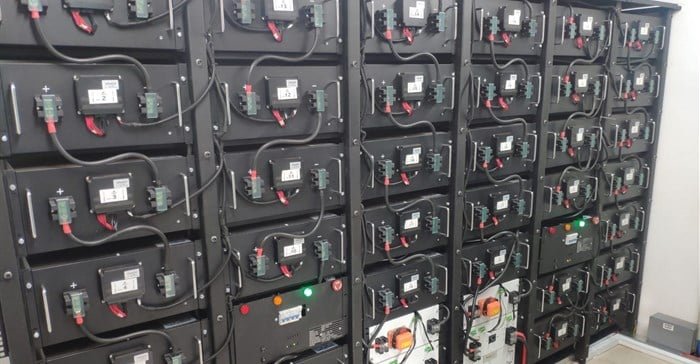While Eskom basks in the glow of improved performance, a hidden force is quietly reshaping South Africa’s energy landscape. Behind the scenes, a revolution is brewing – solar panels sprouting on homes and businesses, coupled with the rise of battery storage, are dramatically reducing reliance on the national grid. As 2025 unfolds, it’s clear that the power to keep the lights on is increasingly shifting into the hands of the people.

High voltage battery energy storage systems will become a regular feature in property development. Source: Revov
“We are reading about the continually improving energy availability factor at power stations and the improvement at the national utility being the result of the president’s electricity turnaround plan,” says Revov MD Lance Dickerson.
“This is all good news and so credit must go where it is due. However, we cannot downplay the role that behind-the-meter solar installations, massive private renewable energy installations and battery energy storage systems (BESS) have played in significantly reducing the demand on Eskom.”
Beyond this, explains Dickerson, the woeful state and inadequate capacity of the national transmission grid is forcing companies and households to continue investing in alternative means of ensuring the lights stay on.
This, he explains, has driven the battery industry’s trends in 2024 and will continue to determine the shape of the industry in 2025.
Big increase high-voltage (HV) systems
There was a significant increase in demand for HV battery systems, or BESS as they are more commonly known, by commercial and industrial businesses in 2024.
“This increased demand, which to be fair we saw coming years ago, has resulted in companies like ours innovating to provide value-added services to the systems such as remote real-time battery monitoring, remote access and control enabling remote shutdown if needed and, very importantly, local firmware and hardware components,” says Dickerson.
He says the dip in the LV market, which primarily serves the residential sector, put a strain on the entire sector.
“Some businesses that hadn’t diversified were put under immense strain, many even closing their doors.”
This was caused by a few factors, including what can best be described as dumping Chinese batteries in the market at very low prices – of course, without the support – and the residential sector reaching a point where most of those who could afford to build backup power solutions for their homes had done so.
“The straw that broke the camel’s back has been the long period of no load shedding because load shedding tends to drive up consumer demand,” explains Dickerson.
Local assembly and support
Dickerson says 2024 saw an understanding emerge in the market about the importance of local support.
“Battery systems are feats of engineering, nowhere more so than in a high-voltage installation,” he says
“Businesses quickly realised that relying on on-site international support from China means exceedingly long delays. This is not only costly but also dangerous.”
“On the other hand, local support and responsiveness anywhere in the country, means issues can be addressed almost immediately.”
Dickerson says that he expects these trends to continue throughout 2025, where industries continue to build their own resilience against an unreliable energy grid and also to offset the rising costs of procuring electricity from Eskom. Looking ahead, he says there is great potential for innovation, and, he says, don’t be surprised to see the emergence of mini grids in the private sector, especially in housing complexes and business parks.
The rise of mini grids
“It will be interesting to see how this plays out, but there is a significant opportunity in community developments, such as housing or business complexes,” he continues.
“The rapid expansion of high-density living and working environments are putting a strain on the existing power distribution infrastructure, leading to frequent outages and reliability issues.”
The opportunity lies in developers partnering with solar and battery backup specialists to build community-based mini-grids.
Let’s consider a housing complex that is designed with this in mind. The entire complex would have a shared solar power generation system, with the solar panels installed on the common property. Rooftops are common property. The generated solar power would then be stored in a centralised battery system, also owned and managed by the complex.
“The electricity generated and stored in the battery system would be distributed to the individual units within the complex, rather than relying solely on the grid,” he says.
“This would allow the complex to become more self-sufficient and less dependent on the unreliable grid power supplied by Eskom.”
External risks
Dickerson adds that during periods of high demand or when the complex’s solar and battery system is unable to meet the full power requirements of the community, Eskom would provide the additional electricity.
“Theft, vandalism and serious distribution challenges often plague areas with high-density living,” he concludes.
“Certainly, in areas on the outskirts of Johannesburg, high-density housing estates and business parks are being built on what was semi-agricultural land meaning the infrastructure just can’t keep up with the development.”
Dickerson says that systems such as these would need to be scalable to adjust to the need for additional power generation and storage capabilities.












